
Breach Of Contract
A contract in a simpler term is a relation between two parties or people via an agreement to fulfill a certain promise.
BREACH OF CONTRACT
- Introduction
As a social being every day we come in the contact with large or small number of persons and there is a way of conduct towards every component of the society, which is done by rules and regulations that state imposes on its citizens. Like-wise in our daily life we knowingly unknowingly enter into a contract for e.g. buying bread butter from shopkeeper we enter into a contract of sale. A contract in a simpler term is a relation between two parties or people via an agreement to fulfill a certain promise.
- Definition of Contract
The body of a contract contains various organs namely Proposal or Offer meaning a person shows his or her willingness to perform or not to perform an act, Promise meaning when the proposal offered to a person accepts the proposal becomes a promise , Consideration meaning when the person who has made the promise known as promisor makes a desire and on his desire the person who has accepted the promise known as promisee performs or abstain performing something such promise is consideration, Agreement means collection of promises together which forms the consideration is an agreement. The Indian Contract Act 1872 defines under section 2 (h) defines contract as an agreement which is enforceable by law is a contract.
Example – A xyz company provides cleaning services will sign an agreement with their clients for providing cleaning services and for that service the client will pay certain amount on certain time whenever services will be provided.
- Essentials of Valid Contract
A contract must have following essential elements:
- Acceptance and Offer- There must be two parties one proposing the offer and other accepting the offer.
- Creation of legal Relationship – The intent of the agreement for contract shall be legal and not any other religious or social relation otherwise it will not be a valid one for the particular cause.
- Consideration must be Lawful- There must be any kind of consideration such as a price of return between both the parties and should be of a real value in eyes of law and should not be obtained fraudulently.
- Eligibity for Contract-The person entering into the contract should be a major and of sound mind and shall not be disqualified by law to enter in a contract.
- Free Consent- While framing of valid agreement there should not be any fraudulent mindset there should be free will from both the parties during giving their respective consent.
- Object with Law- The subject matter or purpose of the agreement should be law abiding; it should not be immoral as then those will not be enforceable at the court of law.
- Not Expressly Declared Void- There are agreements which are declared void by the law example restraint in marriage, restraint in trade such agreements are declared void and are not in public interest.
- Capable of Performance- An agreement must be capable of performance which means its performance can be fulfilled and is not an impossible act for example A agree to give a sum of 1000 to B if he runs at a speed of 2000 km per hour which is impossible then that agreement would be void.
- Legal Formalities- special agreements require special formalities suppose when a promise is there to pay then debt should be time barred and must be in writing is a type of specific legal formality.
- Different forms of Contract-
- Contracts that can be Expressed – Contracts can be expressed in either form orally or by written means in whichever way it is communicated accordingly the contract will be created.
- Contracts that can be Implied – These contracts are not expressed they are result of an act Example- xyz person boards a train in Mumbai.
- Contracts that can be executed – These contracts are those where both parties have mutually agreed and signed the agreement enforcing a relationship between them which will be fulfilled.
- Contracts which are valid- The contracts which are enforceable
{lawful}under the law are said to be valid contract.
- Contracts which are void- A contract which cannot be enforced in the eyes of law are void. example contract with a lunatic person.
- Contracts which are voidable- when a party has promised to perform a contract within a specific period but fails to do so due to fraud or mistake or wrong representation then it becomes unenforceable under the law. A voidable contract is valid unless it is declared voidable by court of law.
- Quasi Contracts – These contracts follow rule of equity under law meaning a person cannot become rich at cost of another person. Example – A leaves his goods in B’s house by mistake, B must return goods or pay the price.
- Breach of Contract
2.1 Meaning of Breach of Contract
Breach is referred as an act of failure to perform a certain duty. Breach of contract is a legal cause of action meaning a claim that allows a party to seek judicial remedy which arises when a party fails to fulfil his promise already mentioned in the contract and for that reason the other party suffer losses or damages. For instance, the failure to supply goods or provide services to other party as agreed in the contract.
Case Law Example- M/S Murlidhar Chiranjilal vs. M/S Harishchandra Dwarkadas & Anr (1961)-In this case supreme court held that there was a breach of contract as a railway receipt was to be delivered on 5th of August and the said delivery was not done on the date mentioned.
2.2 Kinds of Breach of Contract
- Actual Breach of Contract - In this type of breach, a party fails to perform an obligation and the due course is over and the knowledge of failure is with both the parties regarding the breach of performance of contract. For Example – A promised B that he will deliver the materials to B’s house but he failed to do so by the due date represents actual breach of contract. Case Example- R Venkataraman vs. Hindustan Petroleum Corporation Ltd. The court found that there was a breach of contract of actual nature in which the defendant failed to provide a dealership of petroleum to the plaintiff.
- Anticipatory Breach of Contract- Also known as breach of contradiction, in this type of breach the party commits the breach of performance of contract before the due date arrival. This could be done in two possible ways when the promisor does an act which is impossible and other way is his intention to noy to perform the act. For Example- A promises B to deliver a cart of mangoes before a certain date and before the date comes A distributes mangoes to his relatives so he breached the contract before the due course and didn’t fulfil the contract.
Case Example- In Frost vs Knight (1872) L.R. 7 Ex. 111, when the promisor to a contract shows his / her intention not to continue the contract thereby unable to fulfill his/ her obligations under the contract, he/she is under repudiation of the contract. Under such circumstances the promisee may hold the notice of such intention as above as inoperative and hold the subject party responsible for nonperformance of the contract and thereby may accuse him of breach of contract in the court of law. On the other hand, if the promisor chooses to neglect the notice of repudiation, then the contract remains alive and both the parties are bound to their obligation but the promisee may take advantage to justify the super venting circumstances for the repudiation so as to decline and complete the contract.
- Material Breach of Contract- A material breach of contract occurs when a party fail to perform its obligations, which becomes so crucial that the entire purpose of the contract is defeated. For Example- State Bank of India vs. Mula Sahakari Sahkar karkhana Ltd. (2006)- the court determined that the defendant’s failure to repay the amount of loan was a material breach and entitled the bank to enforce its security interests.
- Repudiatory Breach of Contract – It is an important breach of contract that gives the party two options either allowing the aggrieved party to accept the breach or to terminate the contract permanently. For Example- HPA International vs Bhagwandas Fateh Chand the Supreme Court held that every contract has its core or integral part that its breach would change the entire contract which will cause a fundamental damage to contract ultimately leading to termination of the contract.
- 5. Minor Breach of Contract- also known as partial breach of contract in this type of contract a party fails to understand some portions of the contract and lead to nonperformance of some parts of the contract.
Case Example- Ramavtar Sharma vs State of M.P. & Or. 11 September ,2019-In this case, the court held that in a contract if money of royalty is unpaid for more than 3 months or there is any breach of contract then the government may either cancel the contract and take the possession of land or if the Government is satisfied that the breach is minor then it may instead of cancelling the contract forfeit a part of the security deposit and the lease will have to make up the required amount within 15 days.
2.3 Causes of Breach of Contract
- Ambiguous Contract –
One of the main causes of breach is the mentioning of unclear terms in the contract, vague information which lead towards misunderstandings and difficult interpretation of the contract.
2.Failure of Performance-
The failure of performance of contract could be due to many reasons such as inadequate resources, negligence etc also establishment of unrealistic expectations out of contract leads towards failure of performance of contract.
- Poor Communication and Documentation-
Insufficient supplement of documentation as well as poor communication skills leads to breach of the contract. Here a party fails to communicatee with effectiveness and deficient in terms of documentation making it difficult to enforce the terms of contract.
- Lack of Understanding-
When both the parties fail to understand the terms of contract also rushing into contracts without careful consideration can ultimately lead to disputes and termination of contract.
- Inadequate Dispute Resolution Mechanisms-
Dealy in dispute resolution mechanisms can contribute towards the breach of contract. The ADR methods sometimes result in costly and unsatisfactory conclusions also become time consuming leading to worsening of mechanism of smooth termination.
- Doctrine of Frustration
The Doctrine of Frustration is also known as doctrine of Impossibility, in this type of contract the contract becomes impossible to perform due an impossible event that occurred after the contract was made and the parties automatically becomes discharged of the liabilities and duties of the contract. Section 56 is based on maxim “les non cogit ad impossibilia” meaning law will not compel a person to do an act which he cannot possibly do. Section 56 of Indian Contract act deals with Doctrine of Frustration which as follows- as with most laws in India, the contract act is influenced by English laws/doctrines (The act was passed when India was under colonial rule). This doctrine constitutes the Indian Contract Act,1872, as Section 56 (Agreement to do impossible act). An agreement to do something, which was possible or lawful when the contract was constructed, but subsequently, becomes impossible or unlawful without any fault of either party, then such an act will be void.
Case Example- Energy watchdog vs Central Electricity regulatory Commission (2017)- In this case court held that the coal which was being exported from Indonesia does not make the contract incapable of being performed so the contract cannot be declared frustrated there were alternatives methods to fulfil the obligations of the contract hence in this case this Doctrine was inapplicable.
- Compensation/ Damages for Breach of Contract
The Latin maxim “ubi jus ibi remedium” states, where there is wrong, there is a remedy, hence the following remedies are-
4.1 Damages which are compensatory- The word damages mean monitorial compensation which are received when the loss is suffered by the party. According to section 73 of Indian Contract Act when a contract is broken then the party which is aggrieved is entitled for damages such damages received when the contract is broken or any damage or loss caused to him arising naturally in due course or the damages which were known to the parties they will receive from the breach. Those compensation which are indirect and remote are not to be given to the parties. Also, when any obligation created by contract has not been discharged the party aggrieved is entitled to receive from the party who is on default who has made contract to discharge it but broken his contract. According to section 74 – Compensation for breach of contract is given according to the amount of penalty which shall be paid after the breach shall be given and no amount exceeding the penalty mentioned in the contract must be given. According to section 75 a person who has rightfully done his part of the duties has the right to receive the compensation.
Case Example- Daya Shankar Upadhayay vs State of U.P. And Others on 13 December, 2017- In this case the compensatory damages have been awarded against Late Shiv Ram Bhatt and appeal was allowed and compensatory damages of Rs. 1 lakh per petitioners was awarded.
4.2 Damages which are General and Ordinary- These are those damages when a person files for a claim are direct and inevitable, these are obvious damages that incurred at the time of breach. These damages include the pecuniary compensation for the loss actually incurred.
Case Example- Ghaziabad Development Authority vs Union of India (AIR 2000 SC 2003), the Hon’ble court held that in case of breach of contract mental anguish is not a criterion for general damages in order to claim damages a party must plead in a manner and show loss he suffered.
4.3 Damages which are special in nature- These damages are also known as consequential damages and are a result from a breach of contract under some special circumstances that are attached to the contract. In this type of contract special loss is likely the result as the contract has special notice attached to the contract which when not fulfilled the party has to compensate the also the special loss attached to it.
Case Example- In Madras Railway Company vs Govind Rao- In this case, the plaintiff has delivered sewing machine cloths to a railway company which were expected to be sent to a place where the plaintiff was expected to carry out his business and earn special profits, due to fault the goods weren’t reached and also the festival peak time when maximum earning was to be done was also over, plaintiff claimed for the loss of his profits.
4.4 Damages which are exemplary or punitive – These damages arise due to malafide conduct from the defendant in order to severely affect the mental status of the plaintiff resulting in severe mental distress. The damages are punitive in nature and intention is to punish the defendants.
Case Example- Nirog Pharma Pvt Ltd vs Umesh Gupta & Anr on 21 October, 2016- In the present case the claim of punitive damages is of Rs 2 lacs only which was awarded to the plaintiff as the defendants had infringed the registered trademarks of the plaintiff as well committed tort of passing off, rendition of accounts etc.
4.5 Liquidated and Unliquidated damages – These damages are those in which parties agree to pay a certain amount which is predetermined in the contract at the time of breach whereas unliquidated damages are those which courts after assessing of the loss and injury caused to the party grant the party who is suffering the breach.
Case Example- Fateh Chand vs. Balkishan Das (1963)- In his case the plaintiff aggrieved received a sum of Rs 25000 under the agreement and delivered the possession of building in his occupation to defendant but sale was not completed before the expiry period and for this reason each party blamed each other.
4.6 Injunctions
Injunctions are prohibitive writs, in this a party has promised to not to do a certain act according to the rules of the contract but later on commits the act for which the plaintiff can go to court and which will stop the party to do the act which he has promised in the contract to not to do so. The injections are governed by 2 acts Specific Relief Act ,1963 and the Code of Civil Procedure ,1908.
Case Example- In the case of Gujarat Bottling Co. Ltd. vs. Coca-Cola Co. (1995), the court issued an injunction to prevent the defendant from entering into a competing agreement, which would have breached its existing contract with the plaintiff.
4.7 Specific Performance-
In a case, the nature of the loss is such that it can’t be compensated with a monetary value it is a discretionary remedy in which a party wants absolute performance as per the terms of the contract and the court directs the party who was at breach for the specific performance and he is bound to act according to the contract. The remedy for specific performance is under section 10 of the Specific relief Act.
Case Example- In case of Shree Hanuman Cotton Mills vs. Tata Air Services (1970), the court granted specific performance to the plaintiff as the defendant had failed to supply a unique type of machinery, which could not be easily procured from another source.
4.8 Quantum Merit- it is a method which is used to determine exact amount owned to a person. The party receives as much as amount as much as he has performed or done. The principle of Quantum merit is applied where a party gets an unjust enrichment.
Case Example- Mahanagar Telephone Nigam Limited vs Tata Communications (the MTNL case) In this case the supreme court held that if there is an amount for damages in a contract then breach of only that amount will be given and not above on such amount be refunded.
4.9 Suit for Recession- when one party breaches the contract by not obeying the rules then the contract is cancelled, the other party can file a suit for the loss occurred to obtain the damages as a remedy.
Case Example- Dwarka das vs State of Madhya Pradesh And Anr 10 February,1999-In this case the respondent was guilty of breach of contract as much as the recession of contract which was held to be unjustified, the plaintiff contractor had executed a part of the contract, the contractor would be entitled to damages by way of loss of profit.
- How Breach of Contract can be avoided
Following things one can do to avoid breach which are-
5.1 Clarity- the language used in contract must not be ambiguous or vague it should be well defined to avoid hasty outcomes also the rules and regulations shall be law abiding and all the necessary terms and conditions of the contract must be clear between both the parties.
5.2 Expectations by the parties – The expectations out of the contract should not be impossible which can’t be fulfilled. Both parties should be able to fulfil the expectation of one another and, the expectations should not give false hopes of unrealistic future rather fulfil present obligations.
5.4 Legality- the contract must be a legal on should not be against the law enforced and if compliancy of legality is not followed one cannot reach out to the court in case of any kind of breach.
5.5 Advance fix of Sum to be paid off - if the parties during the time of making of the contract fix the amount which will be paid will not lead towards the breach of the contract but the amount payable shall be fixed and not undefined.
- How to file a suit for Breach of Contract
- Selection of the venue – it cannot be just any other place the place should have connection with the breach of the contract and the defendant must have the connection with the location that is the venue can also be located at the place of the defendant should be establishing connection that must have authority of court.
- The court on which the matter will be heard must have the jurisdiction of the matter of breach of contract, family courts don’t have jurisdiction to hear breach of contract of cases.
- The nature of the contract must identify its court itself and the laws of the state and nation it will follow.
- After the breach of contract has happened the limitation is 3 years from the date of breach to file a suit.
- There are alternative ways for parties to file a suit such as ADR methods – Mediation, Arbitration etc.
- An experienced contract Advocate will further help to disperse off the case accordingly.
Case Example- Bishamber Nath Agarwal s Kishan Chand (1989), In this case Allahabad High Court held that when specific guidelines are mentioned in a contract then the actions must be taken as per contract and the obligations must be fulfilled as per the contract the party cannot act on his or her own wish.
7.My views on Breach of Contract
Breach of contract is a part of contract which may or may not arise largely depends on the parties mutual amicable understanding the Indian judicial system has relief as damages arising due to breach to the aggrieved party but it also the ethics of contract also depends on the intention with which the contract has been framed off.
- Conclusion
Breach of contract refers to the un-fulfillment of the obligations by the parties involved in the contract leading to damages for other parties which can be recovered under judicial system, the severity of breach may vary depending upon the extend of the fraud. Whenever and wherever, there will be loss the party will get the reasonable compensation from the courts. Thus, the above research governs us every possible way in which the treatment of breach of contract is done under the Indian Contract Act ,1872.
- Case Laws relating to Breach of Contract
- Bharat Sanchar Nigam Ltd. V. Motorola India Ltd. 2009 (2) SCC
2.Iron & Hardware (in dia) Co. vs Firm Shamlal &Bros. AIR 1954 Bom 423
- Denka Advantech Private Limited v. Seraya Energy Pvt Ltd, {2020} SGCA 119
- Fateh Chand vs Balakrishnan Dass, AIR 1963 SCC 136
5.Maula Bux v. Union of India 1969 (2) SCC 554
6.Kaolash Nath vs Delhi Development Authority (2015) 4 SCC 136
7.Dunlop Pneumatic Tyre Co Ltd v New Garage & Motor Co Ltd. [1914] UKHL 1
- M. Lachia Setty & Sons Ltd vs. Coffee Board Banglore AIR 1981 SC 162
- Sir Chuni Lal Mehta & Sons v. Century Spinning and Manufacturing Co. AIR1962 SC 1314
- Cavendish Square Holding BV v. Talal EI Makdessi and Parking Eye Limited v. Beavis, [2015] UKSC 67
- Notable Case law of Breach of Contract
Maula Bux vs Union of India (uoi) on 19 August, 1969
Subject of case – Breach of Contract
Facts of Case-
- Maula Bus was the plaintiff who entered into contract with Government of India on February 20, 1947, for supplying potatoes to Military Headquarters U.P. also he deposited Rs. 10,000 as security for performance of contract.
- He entered into another contract with the GOI on March 4, 1947 to supply same with poultry eggs, fishes also he deposited Rs. 8,500 for the due performance oof the contract.
- The plaintiff was defective in making the supply of the commodities as promised so the GOI Government of India cancelled the contract and forfeited the amount paid by the plaintiff.
- The plaintiff filed a suit at civil court of Lucknow for a decree of Rs 20,000 as he deposited those amounts with Government of India for the due performance of the contracts.
- The Trail court decreed the suit saying that The GOI was justified in cancelling the contract but cannot forfeit the amount of deposit by the plaintiff as they did not suffer any loss from the default of the plaintiff.
- An appeal was filed in High court of Allahabad which modified the decree and awarded Rs 416.25 only with interest at the rate of 3 percent from date of suit.
- The High held that during 1947-1948 it was already a crisis due to partition after effects the forfeit of money was not unfair and the money deposited by the plaintiff was an earnest money.
- But in this case the plaintiff deposited money and not the purchaser and such deposits cannot be regarded as earnest money. According to section 74 of the contract act if a sum has to be paid after the breach of contract the party complaining oof the breach is entitled to receive such damage from the party who has broken the contract without any reasonable cause.
- The Supreme Court set aside the order of High Court and held that the Union Of India will have to pay plaintiff Rs. 18,500 with interest at the rate of 3 percent per Anum.
Laws Laid down- Section 74 of Indian Contract Act
Judgement – Appeal of plaintiff was allowed
11.Reference
- Book Law of contract 2 Dr. S. K. Kapoor
2.Book Bare act Indian Contract Act,1872
- Book Business regulatory framework Dr O. P. Gupta
- https://www.slideshare.net/shantanu_leo/
- https://www.defactolaw.in/post/understanding-breach-of-contract-in-india
- https://blog.ipleaders.in/a-brief-overview-on-breach-of-contract/
- https://www.legalmatch.com/law-library/article/i-want-to-sue-for-breach-of-contract-what-is-the-proper-court-to-file-with.html
- https://ijcrt.org/papers/IJCRT22A6389.pdf
- https://indiankanoon.org/doc/339747/
- https://blog.ipleaders.in/breach-of-contract-case-laws/
- https://blog.ipleaders.in/breach-of-contract-case-laws/
Author is a Practicing Advocate in Devshree Majumdar Practicing in Chhattisgarh High Court
#phenixbaylegal #contractdrafting #breachofcontract #contractact #lawstudent #lawexam #contractblog #caselawsoncontractact
More >>
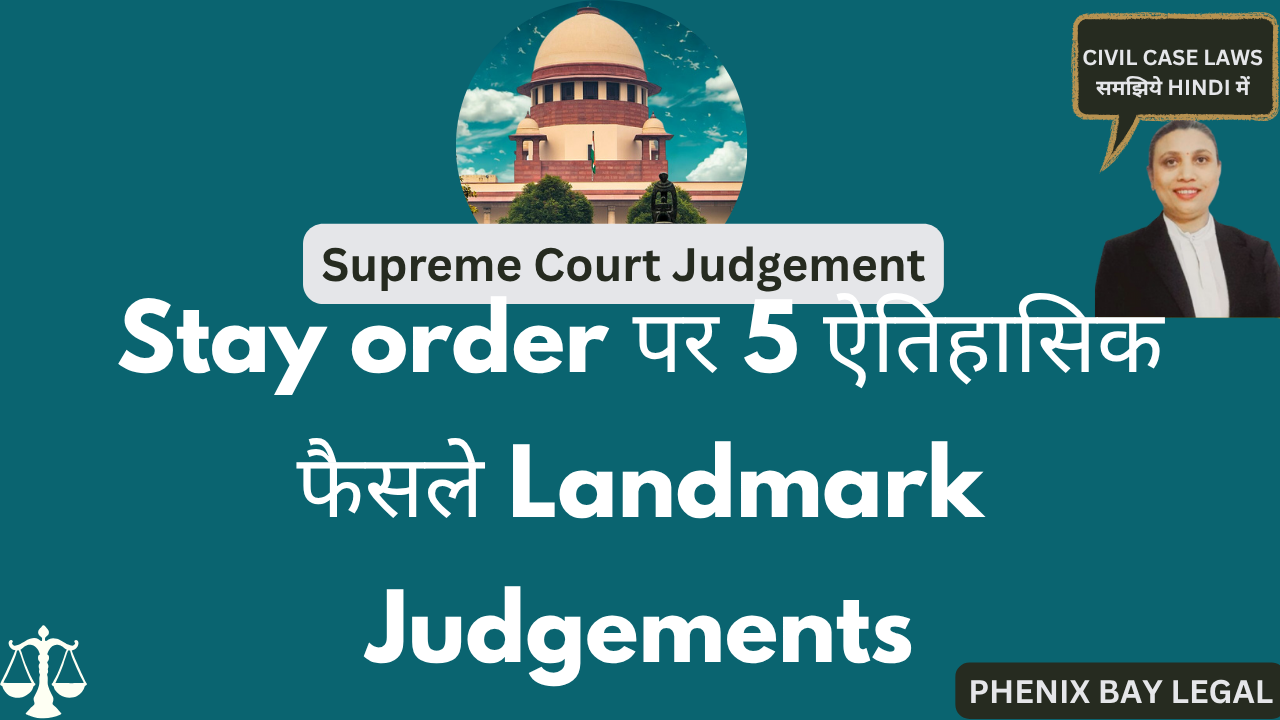
Landmark Judgement on Injunction
In civil, commercial, or even family disputes. But when is a simple injunction suit enough? When do you need to add a declaration of title? And how do courts balance urgency vs evidence in interim relief?
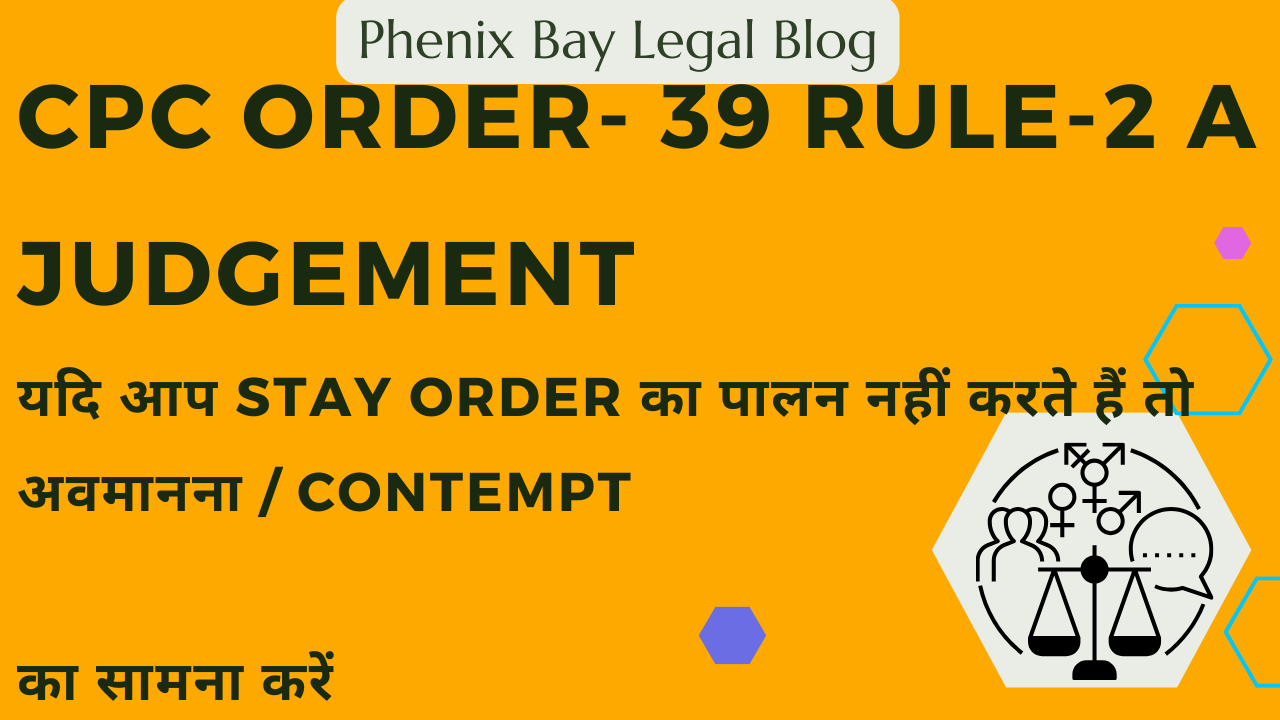
Case Analysis: Stay Order Violation and Contempt of Court by Supreme Court of India
Giving an undertaking to the court is equivalent to an order of injunction—any violation invites contempt proceedings.Injunction orders remain valid until formally vacated by a court—violation before vacation can lead to punishment.
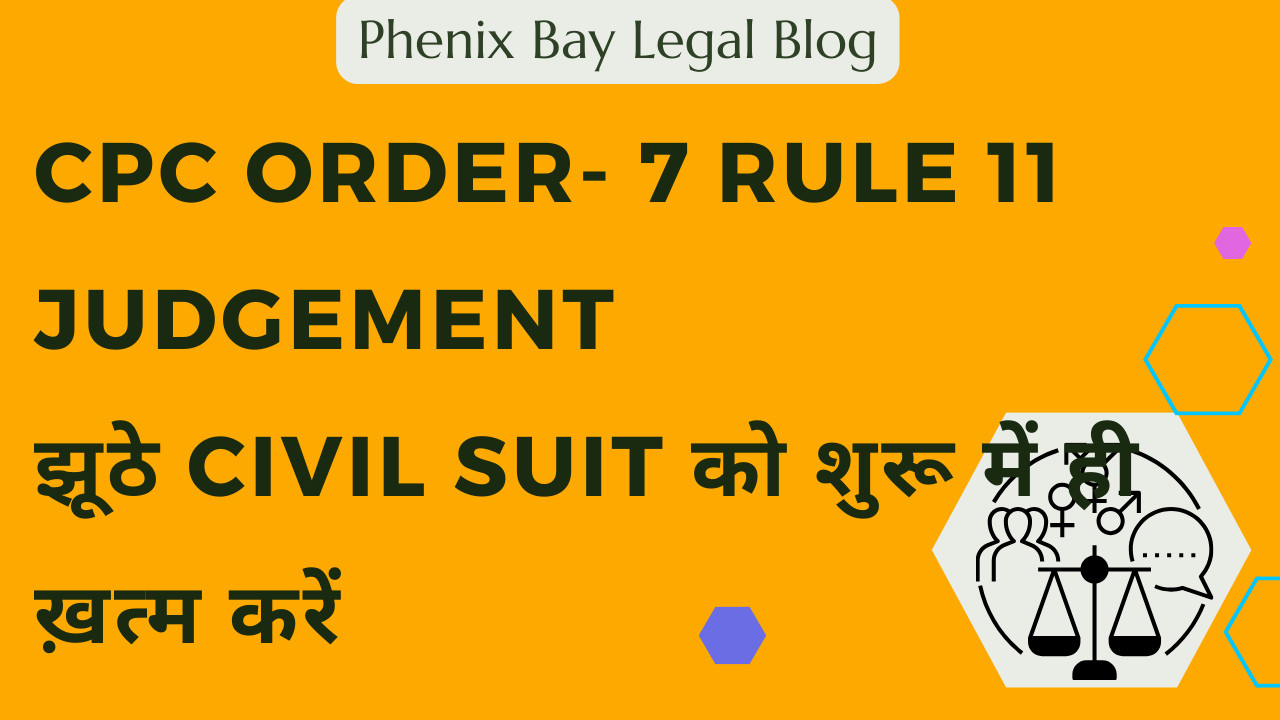
Order 7 Rule 11 of CPC Explanation in Land Mark Judgement
The Sopan Sukhdeo Sable judgment is a landmark ruling that reinforces Order 7 Rule 11 of CPC as a safeguard against frivolous and legally untenable claims. It highlights the importance of examining only the plaint’s contents to decide whether a suit should be dismissed at the threshold.
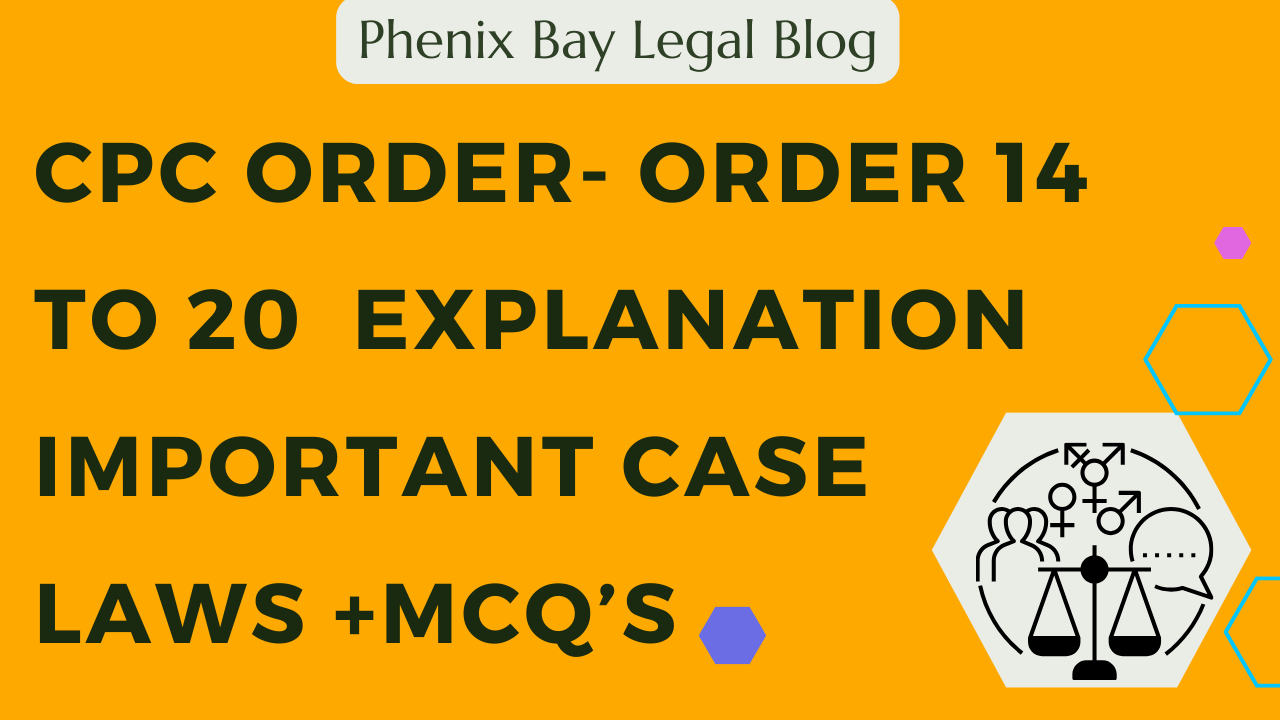
CPC Order- Order 14 to 20 Explanation IMPORTANT CASE LAWS +MCQ’S for Judiciary Exam Preparation
CPC Order- Order 14 to 20 Explanation IMPORTANT CASE LAWS +MCQ’S for Judiciary Exam Preparation
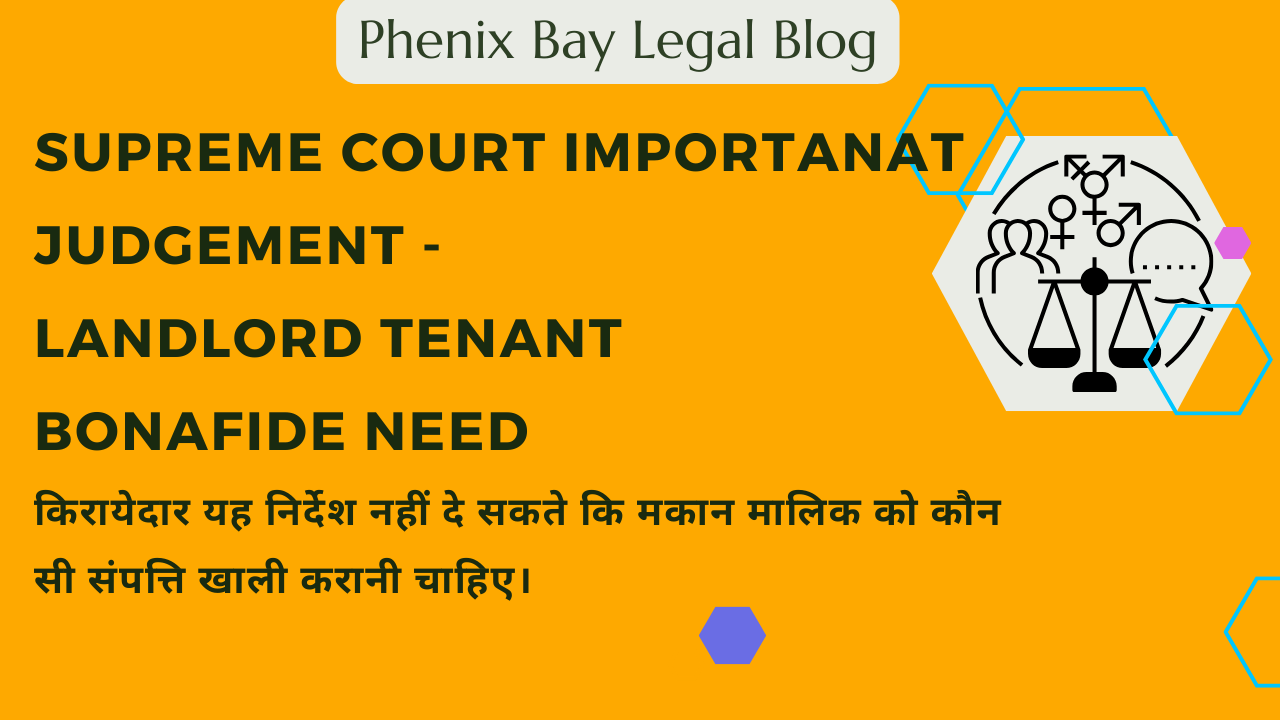
Supreme Court ImportanatJudgement - Landlord Tenant Bonafide need
This case involves a dispute over eviction of a tenant based on the bona fide need of the landlord. The Supreme Court ruled in favor of the landlord, reversing the High Court's decision. Below is a detailed breakdown of the judgment with relevant legal principles, precedents, and reasoning.
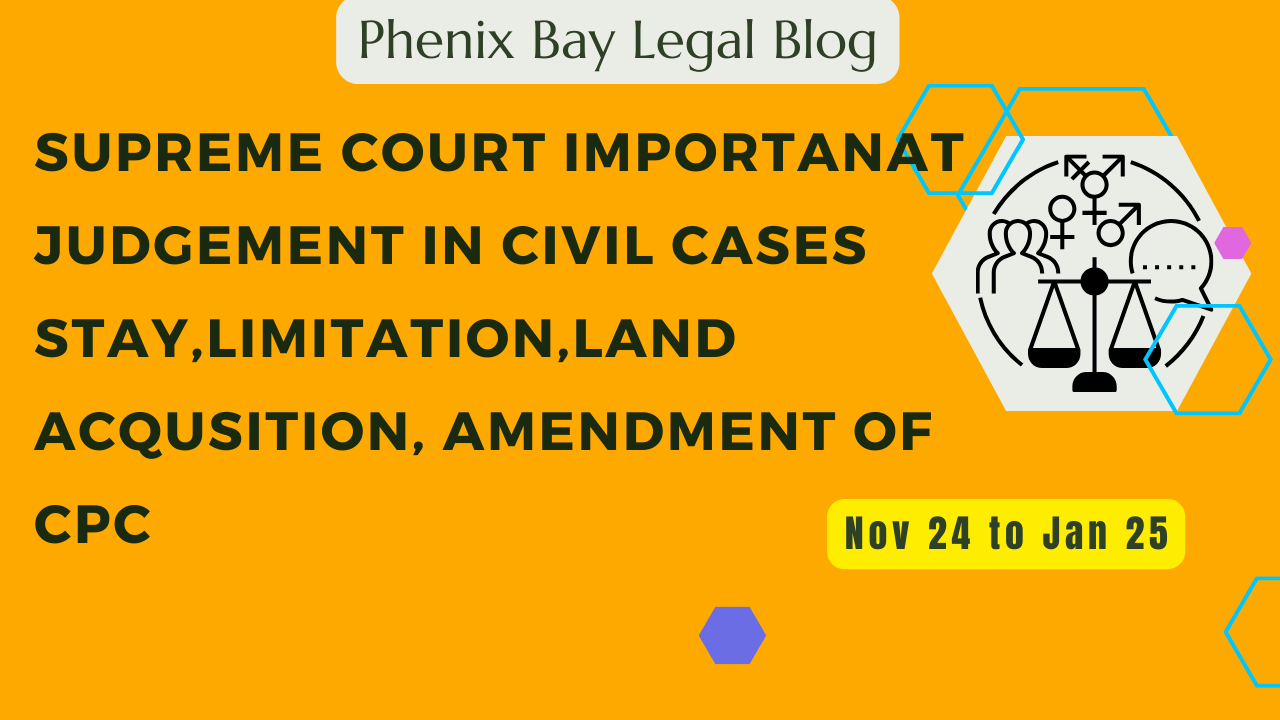
Important Civil Cases Judgement from Supreme Court - November 24 to January 2025
Supreme Court Importanat Judgement in Civil Cases related to Stay,Limitation,Land Acqusition, Amendment of Civil Procedure Code